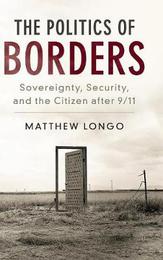
|
The Politics of Borders: Sovereignty, Security, and the Citizen after 9/11
Hardback
Main Details
| Title |
The Politics of Borders: Sovereignty, Security, and the Citizen after 9/11
|
| Authors and Contributors |
By (author) Matthew Longo
|
| Series | Problems of International Politics |
|---|
| Physical Properties |
| Format:Hardback | | Pages:264 | | Dimensions(mm): Height 235,Width 156 |
|
| ISBN/Barcode |
9781107171787
|
| Classifications | Dewey:363.285 |
|---|
| Audience | | Tertiary Education (US: College) | | Professional & Vocational | |
|---|
| Illustrations |
3 Line drawings, black and white
|
|
Publishing Details |
| Publisher |
Cambridge University Press
|
| Imprint |
Cambridge University Press
|
| Publication Date |
7 December 2017 |
| Publication Country |
United Kingdom
|
Description
Borders sit at the center of global politics. Yet they are too often understood as thin lines, as they appear on maps, rather than as political institutions in their own right. This book takes a detailed look at the evolution of border security in the United States after 9/11. Far from the walls and fences that dominate the news, it reveals borders to be thick, multi-faceted and binational institutions that have evolved greatly in recent decades. The book contributes to debates within political science on sovereignty, citizenship, cosmopolitanism, human rights and global justice. In particular, the new politics of borders reveal a sovereignty that is not waning, but changing, expanding beyond the state carapace and engaging certain logics of empire.
Author Biography
Matthew Longo is Assistant Professor of Political Science at Leiden University. Previously, he was the Clayman Junior Research Fellow in Politics and Political Ideas at St Anne's College, Oxford. He received his Ph.D. with distinction from Yale University, Connecticut in 2014 and was awarded the American Political Science Association's Leo Strauss Award for the Best Doctoral Dissertation in Political Philosophy. His work has been published in the American Journal of Political Science and Democratization, the New York Times and the Los Angeles Times, and has been featured in the Washington Post and National Public Radio.
Reviews'Beautifully written, Matthew Longo's book opens our eyes to the transformation of state borders in an era of new security technologies and big data. Longo's approach is rather unique in its combination of anthropological fieldwork and normative argument. His target audience is not any academic discipline, it is citizens who want to understand the new threats to their freedom, and do something about it too.' Rainer Bauboeck, European University Institute, Florence 'Longo crosses disciplinary boundaries in order to make visible the complex realities of contemporary borders. This richly detailed and conceptually imaginative work provides a valuable critical perspective on a topic of growing importance in the modern world.' Joseph H. Carens, University of Toronto 'Political theorists have expended much energy debating whether and how far states have the right to control movement across their borders, but have said little about what borders and border control might mean for the relationship between the state and its citizens. Matthew Longo offers a deep and powerful - and at times, disturbing - examination of this question in his important and timely study.' Chandran Kukathas, The London School of Economics and Political Science 'Longo, an assistant political science professor at Leiden University, delivers a comprehensive study of the politics surrounding borders and border patrols, focusing on the technological advancement of and conceptual changes to security measures since 9/11. ... Longo's tone is urgent throughout, as when he writes, 'This is not simply a question of citizenship and sovereignty, but at core, the future of human rights protection in a data-centric world'. Longo outlines possible solutions as well as current problems, stressing the growing necessity of 'cross-border cooperation' between the US and Canada as well as between the US and Mexico, and proposing that neighbouring countries create 'collaborative zones' to accommodate migrants and refugees seeking safety. Longo's debut, complex and impressive in its scope, signals the emergence of an important political theorist.' Publishers Weekly
|